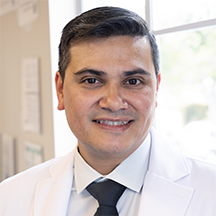
Pituitary Failure
Pituitary Failure (Hypopituitarism) is loss or under functioning of the pituitary gland in which one or more pituitary hormones are deficient
Hypopituitarism refers to under-function of the pituitary gland. The term refers to both anterior and posterior pituitary gland dysfunction. It may be temporary or permanent. Panhypopituitarism refers to complete loss of all pituitary function. Patients with pan-hypopituitarism should carry a Medic Alert bracelet at all times to notify health care personnel of this problem in case of an emergency.
At the Pacific Pituitary Disorders Center we have one of the world’s largest and most extensive experiences in diagnosing and treating patients with hypopituitarism. Our team of pituitary endocrinologists and neurosurgeons work closely together to preserve or restore pituitary gland function and quality of life, whether it is from from a pituitary adenoma, a brain tumor, hypophysitis, pituitary surgery, radiation treatment or a traumatic brain injury.
See Our Publications About Pituitary Gland Function & Recovery.
Role of the Pituitary Gland
The pituitary gland is a small but critical part of the endocrine system, located at the base of the brain. It is often referred to as the “master gland” because it controls the function of other glands and organs in the body by releasing hormones.
The pituitary gland produces and regulates several key hormones that influence many bodily functions, including growth, metabolism, reproductive processes, and stress responses. These hormones include:
- Growth hormone (GH): Regulates growth and metabolism.
- Thyroid-stimulating hormone (TSH): Controls thyroid hormone production.
- Adrenocorticotropic hormone (ACTH): Stimulates cortisol production from the adrenal glands.
- Luteinizing hormone (LH) and Follicle-stimulating hormone (FSH): Regulate reproductive functions in both men and women.
- Prolactin: Involved in milk production.
- Antidiuretic hormone (ADH): Regulates water balance in the body.
When the pituitary gland is unable to produce one or more of these hormones, it leads to a range of symptoms depending on which hormones are deficient.
Causes of Pituitary Failure
Loss of pituitary function can result from damage to the pituitary gland, the pituitary stalk or the hypothalamus. The hypothalamus contains releasing and inhibitory hormones that control the pituitary and reach the gland via the pituitary stalk (infundibulum). Injury to the pituitary gland, pituitary stalk or hypothalamus can occur from:
- A pituitary tumor
- Brain tumor
- Brain or pituitary surgery
- Radiation to the pituitary
- Pituitary apoplexy (hemorrhage)
- Pituitary inflammation (hypophysitis)
- Autoimmune disorders
There appears to be a somewhat predictable loss of hormonal function: the growth hormone (GH), luteinizing hormone (LH) and follicle-stimulating hormone (FSH) secreting cells appear most vulnerable while thyroid stimulating (TSH) and adrenocorticotropic hormone (ACTH) secreting cells are less vulnerable.
Based on our large surgical experience published in 2008 of over 400 patients treated with endonasal pituitary adenoma removal, gland recovery and loss of function can be reliably predicted.
- Approximately 50% of patients will have some recovery of pituitary function after adenoma removal
- 45% will have no change in function
- 5% will have diminished pituitary function
The most important factor in loss of function was tumor size: for endocrine inactive adenomas, 3 cm or greater in diameter, 2-3 cm in diameter, or under 2 cm in diameter, gland function loss was approximately 14%, 7%, and 0%, respectively.
Types of Hormone Deficiencies
The clinical presentation of anterior pituitary hormonal deficiency depends on the acuity of the presentation, the severity of the hormonal deficiency and the number of cells affected. Hormones deficiencies include:
ACTH and cortisol deficiency:
The pituitary gland, often referred to as the “master gland,” is responsible for producing hormones that regulate the functions of other endocrine glands. One of its primary hormones is adrenocorticotropic hormone (ACTH), which stimulates the adrenal glands to produce cortisol. Cortisol is vital for managing stress, maintaining blood pressure, and regulating metabolism.
When the pituitary gland fails to produce adequate ACTH, the adrenal glands do not produce enough cortisol. This condition is referred to as secondary adrenal insufficiency, which differs from primary adrenal insufficiency (where the adrenal glands themselves are dysfunctional).
Symptoms of ACTH and cortisol deficiency
With gradual onset of deficiency over days or weeks, symptoms may include:
- Weight loss
- Fatigue
- Weakness
- Depression
- Apathy
- Nausea
- Vomiting
- Loss of appetite
- Abdominal pain
As ACTH deficiency becomes more severe or has a more rapid onset, (Addisonian crisis) symptoms may include:
- Confusion
- Stupor
- Psychosis
- Serum electrolyte changes (low serum sodium and/or elevated serum potassium)
- Vascular collapse
- Shock and death
In addition to ACTH and serum cortisol testing, in some instances additional confirmatory test is required to determine the cause of adrenal insufficiency.
Adrenal insufficiency can be classified as primary when the adrenal gland function is impaired, or secondary, when the ACTH secretion is impaired at the pituitary gland.
In our institute, patients can undergo Cortrosyn stimulation test and Metyrapone stimulation test. These tests are the gold standard for the diagnosis of primary and secondary adrenal insufficiency respectively.
Treatment ACTH and cortisol deficiency
Treatment consists of glucocorticoids (hydrocortisone or prednisone). For patients with acute adrenal insufficiency (Addisonian crisis), rapid intravenous administration of high dose steroids is essential.
Thyroid stimulating hormone deficiency:
The pituitary gland produces TSH, which stimulates the thyroid gland to produce thyroid hormones (T3 and T4). These thyroid hormones are crucial in regulating the body’s metabolism, heart rate, and energy levels.
When the pituitary gland does not produce enough TSH, the thyroid gland cannot function properly, leading to secondary hypothyroidism (a condition where the thyroid gland itself is healthy, but not receiving enough stimulation from TSH to produce adequate thyroid hormones).
A deficiency in TSH leads to reduced thyroid hormone production, manifesting as hypothyroidism. This condition can have widespread effects on the body, since thyroid hormones are critical for several bodily functions.
Symptoms of Thyroid stimulating hormone deficiency
Symptoms tend to be unspecific and may include:
- Decreased energy level
- Increased need to sleep
- Cold intolerance
- Dry skin
- Constipation
- Muscle aches
- Mood swings and memory loss
The lack of thyroid hormones due to TSH deficiency slows down the body’s metabolism, which explains many of these symptoms, such as weight gain and fatigue.
Treatment of Thyroid stimulating hormone deficiency
This is a very serious and disabling hormonal deficiency that often causes patients with pituitary disease to seek medical attention. Endocrine testing is crucial for diagnosing TSH deficiency and secondary hypothyroidism. Blood tests are used to measure hormone levels, particularly TSH, T3, and T4. Treatment with thyroxin reverses the symptoms and signs over days or weeks and requires careful monitoring of free T4 and total T3.
Gonadotropins deficiency:
The pituitary gland, located at the base of the brain, is responsible for releasing LH and FSH, which are crucial for the functioning of the reproductive organs:
- In men, LH stimulates the production of testosterone in the testes, while FSH is vital for sperm production.
- In women, LH and FSH regulate the menstrual cycle, ovulation, and the production of estrogen and progesterone by the ovaries.
When there is a deficiency in these gonadotropins, the function of the reproductive system is impaired, leading to various symptoms depending on age and gender.
Symptoms and Treatment of Gonadotropins deficiency:
Gonadotropin deficiency can lead to a condition called hypogonadism, where the gonads (testes in men and ovaries in women) are underactive due to insufficient hormonal stimulation. This can cause a range of reproductive and physical issues.
Women with hypogonadism develop:
- Menstrual irregularities
- Absence of periods (amenorrhea)
- Infertility
- Decreased libido
- Vaginal dryness
- Osteoporosis
Our center individualizes care based on family history and concurrent cardiovascular risk or presence of other conditions with estradiol with or without progesterone therapy as clinically indicated. Physiologic hormonal supplementation can alleviate these symptoms and optimize quality of life.
Men with hypogonadism develop:
- Decreased libido
- Erectile dysfunction in some cases
- Mood swings
- Muscle and hair loss
- Weakness and Fatigue
- Osteoporosis
Physiologic Testosterone replacement tend to alleviate these symptoms and restore quality of life.
Growth hormone (GH) deficiency:
The pituitary gland produces GH, which stimulates growth in children and regulates important metabolic processes in adults. GH is released into the bloodstream and acts on various tissues, promoting growth, cell repair, and the maintenance of muscle and bone mass.
G
Symptoms of Growth hormone deficiency
Growth hormone deficiency (GHD) can result from hypopituitarism when the pituitary gland fails to produce adequate levels of GH. The symptoms and consequences of GHD differ depending on the age of onset.
Symptoms of GH deficiency in adults include:
- Decreased muscle mass and increased body fat, particularly around the abdomen.
- Fatigue and lack of stamina, often leading to reduced exercise capacity.
- Depression or other mood disturbances.
- Thinning skin and fragile bones (osteoporosis).
- Increased cholesterol levels and a higher risk of cardiovascular disease.
- Reduced cognitive function, such as memory and concentration difficulties.
GH deficiency in adults does not affect height, but it has significant effects on metabolism and overall health.
Our center offers dynamic endocrinology testing to confirm growth hormone deficiency in challenging clinical scenarios. Dynamic testing with glucagon stimulation test (4 hours) or Macrilen (1.5 hours) after an individualized neuroendocrinology evaluation, can lead to higher insurance approval rates and decreased out of pocket cost when considering growth hormone supplementation in adults.
Central Diabetes Insipidus:
Patients with diabetes insipidus (DI) have a decreased vasopressin hormone (also known as antidiuretic hormone) secretion by the posterior pituitary gland.
Vasopressin is synthetized in the hypothalamus and stored in the posterior pituitary gland. Central DI typically occurs when the posterior pituitary gland, pituitary stalk or hypothalamus are manipulated or injured during surgery or impacted by a brain tumor, a traumatic brain injury, infiltration or inflammation of the pituitary gland or stalk.
Insufficient Vasopressin, symptoms and causes:
The lack of ADH in Central Diabetes Insipidus causes the kidneys to release excessive amounts of water, leading to polydipsia (excessive thirst) and polyuria (excessive urination). The key symptoms include:
- Frequent urination: Individuals may produce 3-20 liters of urine per day, much more than normal.
- Excessive thirst: Due to the loss of water, individuals feel an overwhelming need to drink fluids constantly.
- Dehydration: If water intake is not sufficient to match urine output, dehydration can occur, leading to symptoms like dry skin, weakness, dizziness, and confusion.
- Electrolyte imbalances, particularly low sodium levels (hyponatremia), due to excessive water loss.
Diagnosis of Central Diabetes Insipidus involves:
- Blood and urine tests: These assess electrolyte levels and urine concentration.
- Water deprivation test: This test evaluates how the body responds when deprived of water. In individuals with DI, urine output remains high despite dehydration.
- Imaging tests: An MRI of the brain can help identify any abnormalities in the pituitary gland or hypothalamus.
Treatment of Central Diabetes Insipidus
Treatment is provided with a targeted fluid balance, intravenous fluids and desmopressin (DDAVP) replacement.
Central DI may occur transiently in up to 25% of patients after transsphenoidal pituitary adenoma surgery but is typically only transient (lasting for 1 to several days) but is permanent in 1-3% of patients after pituitary adenoma surgery.
In contrast it is seen in many patients with a craniopharyngioma both before and more often after surgery (in up to 40-50% of patients) as these tumors typically arise along the pituitary stalk.
Replacement of ADH resolves the high urine output of DI. Treatment with DDAVP (a synthetic type of vasopressin) can be given by:
- Subcutaneous injection
- Intranasal spray
- Tablet, typically taken once or twice a day with a weekly breakthrough in dosing
Our multidisciplinary team monitors serum Na closely and has experience in DDAVP dosing and titration.
Schedule an Appointment
Request an appointment, second opinion or record review with one of our Pituitary Specialists.











